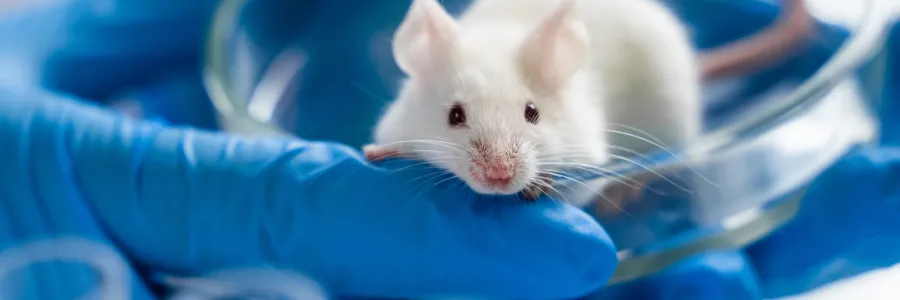Animal Care and 3Rs at the 91次元
At the 91次元 our mission is to advance both science and the well-being of animals through innovative research, benevolent care, and informative outreach, while championing the principles of the 3Rs: Replacement, Reduction, and Refinement.
By embracing our core values and principles, we aspire to be a leading force in promoting ethical and humane treatment of animals, fostering scientific progress, and cultivating a compassionate society.
REFINEMENT

Refined Rodent Handling Practices in Research Facilities
The 91次元 Laboratory Animal Resources (LAR) program is committed to improving animal welfare and scientific outcomes through evidence-based refinements in animal care. All rodents housed and used in our research facilities must be removed from the home box using refined handling techniques only.
What is Refined Handling?
Refined handling techniques minimize stress, improve animal welfare, and increase the reliability of research data. These methods replace traditional tail-pickup with less aversive alternatives:
- Tunnel Handling – Using a handling tunnel placed in the home cage
- Cupped Hands – Scooping the animal using gloved hands to support the body
- Minimal Restraint – Limiting restraint to essential procedures only
Why the Change?
Studies have shown that refined handling reduces anxiety, improves behavioral responses, and may enhance the reproducibility of data. This change reflects our commitment to:
- The 3Rs, especially Refinement
- Improved animal welfare and reduced handling-related stress
- Compliance with the expectations of funding agencies and accreditation bodies
- Applies to all mice and rats in LAR-managed facilities
- Effective for all personnel working with rodents
- Required for removing rodents from their home box during research procedures.
Training and Resources
All personnel working with rodents must complete training in refined handling methods. LAR provides:
- Hands-on training sessions
- Access to handling tunnels and appropriate supplies
REDUCTION AND REPLACEMENT
Environmental Sampling in Place of Sentinel Mice
LAR has transitioned away from using sentinel mice for routine health monitoring in SPF animal facilities. We now employ environmental sampling methods to monitor for pathogens in rodent colonies.
Why the Change?
- Eliminates the need for dedicated sentinel animals
- Reduces animal use and housing costs
- Improves sensitivity and specificity of pathogen detection
- Minimizes stress and potential confounders in research animals
What to Expect
- Routine facility-wide environmental sampling is conducted on a scheduled basis by LAR staff.
- Test results will be communicated to investigators as part of ongoing health monitoring reports.
- Facility entry protocols remain in place to maintain SPF conditions (e.g., PPE, room order, traffic flow).
FAQs
Q: Will this affect my experimental animals or housing?
A: No. Research animals will not be disturbed or exposed to additional procedures.
Q: Can I request a copy of the environmental monitoring schedule or results?
A: Yes. Please contact the LAR Facility Manager to request specific records.
Q: What if I suspect illness in my colony?
A: Notify the LAR veterinary staff immediately for clinical evaluation and targeted diagnostics.
